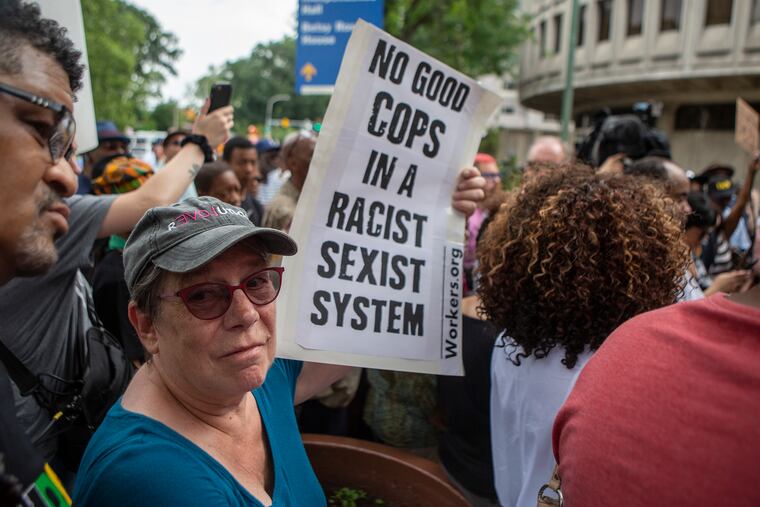When police think they’re seen as racist, that can become a self-fulfilling prophecy | Brain Trust
New research looks at how the perception of police as racist impacts police officers themselves.

The issue: The killing of unarmed black teenager Michael Brown by Ferguson, Mo., police officer Darren Wilson in 2014 reignited a conversation about race and policing in America. That conversation has taken center stage in Philadelphia recently after the publication of a catalog of racist Facebook posts by hundreds of Philadelphia police officers. New research by Erin Kerrison, a criminologist and professor of social welfare at the University of California at Berkeley, and colleagues looks at racism in policing from a unique angle: How does the assumption that they are viewed as racist affect police officers themselves?
The bottom line: Officers who think they are perceived as racist are more likely to use force and other coercive tactics to assert their authority. “If an officer assumes that folks doubt their authority,” Kerrison explains, “[they] might resort to whatever means are necessary to close that gap in perception and effectively convince them otherwise."
To do their jobs, police officers are vested with authority -- when an officer signals you to stop, you are expected to stop. When this authority isn’t respected, police have the ability to use force. So what happens when police officers believe the community generally thinks they are racist and doesn’t respect their authority? That’s the question the researchers set out to answer.
How did the researchers study this question? The framework of the study is “stereotype threat." Kerrison defines stereotype threat as "the concern that you’re going to be evaluated in the terms of some sort of generic negative stereotype of a group to which you belong.“ Stereotype threat is in essence a self-fulfilling prophecy: Police officers who think they are perceived as racist and illegitimate act in racist ways, which further proves to the community that police are racist and illegitimate.
To examine this vicious cycle, the researchers surveyed more than 500 police officers in a large metro area (it is common in criminology studies that participating police departments remain anonymous) on their sense of self-legitimacy and stereotype threat. “We wanted to see how that shapes their answers to questions about use of force,” Kerrison explains.
The researchers found that officers who were more worried that people think they are racist were more likely to view force -- even against department policy -- as acceptable. “[Officers who feel that] people don’t trust them, that they don’t think they belong there, that their authority is questioned and challenged, are more likely to endorse beliefs that force is necessary and justified." These officers were also less likely to think community input on policing is important.
Why does this matter to Philly? In mid-July, Philadelphia Police Commissioner Richard Ross fired 13 police officers for publishing racist, offensive, and violent Facebook posts. (On Thursday, The Inquirer reported that seven officers who posted problematic posts resigned from the force, though it is unclear whether they were among those targeted for firing.) These officers represent a small fraction of the 330 active-duty officers whose posts were captured by the Plain View Project and published in June. When he announced the termination, Ross said the posts "erode the trust necessary for a police department to carry out its core mission.”
Following from Kerrison’s research, the Facebook posts are damaging because they reinforce the perception that police officers are racist. But by saying that misbehaved officers erode trust, Ross suggests that without the racist posts, the community would trust the police. Kerrison counters that individual officers are often held responsible for eroding trust when the problem in fact has more to do with their mission: “Even if they are doing the best they can, according to protocol, they’re going to be engaging in behaviors that community members see justifiably as threatening if not lethal.”
Consider stop-and-frisk as an example. Mayor Jim Kenney and Commissioner Ross cite as evidence of progress that the proportion of stops that are unconstitutional has gone down in recent years. But many in the community view pedestrian stops and frisks as racist and intrusive policing -- even if they are done in a manner that is technically constitutional. So an officer who stops and frisks a black Philadelphian, completely according to protocol, is contributing to the perception that police are racist. The same goes for instances when police officers shoot civilians and the shooting is deemed justified or not criminal.
The takeaway: Community buy-in matters. If the Philadelphia Police Department wants to earn the trust of the community, sticking to the law alone won’t do it. Firing misbehaved officers won’t necessarily be enough to alter the perception of police by the community. The police must reconsider tactics that the community views as racist and illegitimate, even if they are legal. Otherwise they won’t break the cycle that this research suggests: that perception of racism can lead to more force, and so to more racist behavior -- and that ultimately puts public safety at risk.
Brain Trust is a new biweekly column that looks at how new research affects Philly. Ideas? Suggestions? Email Abraham Gutman at agutman@inquirer.com.